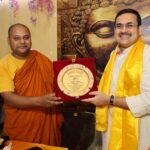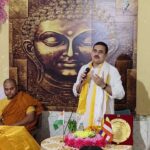NEITHER HONOURABLE NOR GOOD FOR SOCIETY
- By : Anirban Ganguly
- Category : Articles
To offer the crutch of minority status to the Jain community which has excelled in most fields of human action, is to belittle its achievements
The Eastern phalanx at the World’s Parliament of Religion at Chicago in September 1893 was a formidable one. Against every Western and missionary onslaught on India, it acted in bold unison while giving a response and drawing a counter picture. Virchand Gandhi (1864-1901), the young scholar and philosopher who represented Jains at the congregation at Chicago displayed a profound spirit of denominational unity and realisation of the essential civilisational matrix of India, when, expressing a deep solidarity with his mother faith, he rose in defence of Hindus and of India. Absent in him was a sense of segregation or separateness — a separateness which engenders a self-perception of weakness and seeks perpetual protection or safeguards.
On the 14th day of Parliament, one Rev George Pentecost from London spoke on the Invincible Gospel and argued of the “ultimate triumph of Christianity as assured by its essential superiority to all other religions”. The Reverend did not stop at that and launched a broadside against Hindus and India. His specific target was the ‘Hindoo Monk’, Swami Vivekananda. “Some Brahmans of India have been here and have dared to make an attack on Christianity. They take the slums of New York and Chicago and ask us why we do not cure ourselves”. Pentecost followed this by a liberal and intemperate dose of acerbic aspersions on the followers of the Hindu faith.
On the next day, there followed a spirited rebuttal from the representative of Jains. Virchand Gandhi was in his elements when he caustically told the Reverend that “some men in their ambition think that they are Pauls, and what they think they believe, and where should these new Pauls go to vent their platitudes but India? Yes, sir, they go to India to convert the heathen in a mass, but when they find their dreams melting away, as dreams always do, they return back to pass a whole life in abusing the Hindu. Abuses are not arguments against any religion, nor self-adulation the proof of the truth of one’s own…I am very, very sorry for those who criticise the great ones of India, and my only consolation is that all their information about them has come from third-hand, fourth-hand sources, percolating through layers of superstition and bigotry.”
This sense of unity that Gandhi displayed was not contrived and he spoke as part of a continuum of a long and uninterrupted civilisational experience. Pointing at this essential civilisational unity, historian Meenakshi Jain, in her recent study, Rama and Ayodhya, has argued, for example, that “Buddhist, Jain and Hindu sacred centres had stood alongside in India through the ages; at Ellora, Mathura, Kaushambi and Kashi.” Expressions of a common source, a similar inspiration, world-view and life-quest have emerged in abundance from the study of our past.
The present move, thus, of conferring minority status on the Jain community and of trying to segregate it, is a move designed to engineer a rupture in that uniting civilisational thread. Offering crutches to a community which has been at forefront of women’s education and has always excelled in most fields of human action is to belittle its multi-dimensional historic achievements. It basically reinforces voluble proponents of the ‘Neo-Hinduism’ theory, especially in the Western academia, who never tire of conjuring and perpetuating the image of an imagined, fragmented, conflicting Hindu society and India. It is a section which can never really come to terms with a structure which had happily and easily accommodated and lived with teeming diversities within the folds of a larger civilisational matrix. John Strachey, while implementing a colonial ruse, had infamously observed that “there is no such country, and this is the first and most essential fact about India that can be learned. India is a name which we give to a great region including a multitude of different countries.”
He would have perhaps gloated to see this myth still being perpetuated by a section of our leaders and policymakers — all his heirs, in a sense!

















